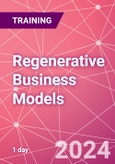What is changing in the results your business must deliver next year, in five or even ten years’ time, because of the imperative for regenerative business? How are the risks changing?
Because of that, what is changing for you in your role; what different results must you deliver, what different risks will you face, and what must you do now to prepare?
It is now clear that our global economy must become regenerative; we must get to net zero, and then keep going to net positive, if we want a better future for our children, and for our older selves. We must do this faster than the degradation processes we have unleashed over the past century; we are already two years too slow in hitting the needed emissions peak, we must catch up and deliver a 43% emissions reduction by 2030 to have any hope.
Business is the most powerful institution on the planet today, and so must and will take a leading role in rebuilding towards regeneration. This means every business will become regenerative, or it will have its Kodak moment and fade into irrelevance.
And to reach sustainability and beyond, every business must deliver the transformation at the right speed while maintaining business health throughout the transformation.
How? Having high, systemic (not transactional) trust between all stakeholders is the key to unlocking the transformation to a regenerative business. Contracts can only deliver transactional trust. So what else is there?
Course Overview
Systemic trust between stakeholders is exactly what incorporation is designed to do. The modern corporation began when the East India company needed more capital than any one wealthy founding family could provide, and so a way was invented to externalise, into the system, trust between financial investors.
Regenerative, net-positive businesses are only viable, anti-fragile, and capable of making the transformation at the speed required:
- when there is systemic trust between all stakeholders representing all six kinds of capital;
- when the work execution and role accountabilities adapt at the speed required;
- when interpersonal and inner-person interactions waste minimum energy by adapting to the changing context at the speed required.
The essence of a lawyer is building the structures and interactions that protect and enable the organisation, specifically around the agreements. The essence of HR is building the structures and interactions around people. The CEO is the weaver that brings all this together for business results. All three have crucial roles to play across the three dimensions above.
Certification
- CPD: 6 hours for your records
- Certificate of completion
Course Content
Welcome and introduction
Course Provider

Graham Boyd,
CEO ,
EvolutesixGraham Boyd, Founder & CEO Evolutesix, is CEO, serial entrepreneur, particle physicist, disruptive innovator and author of Rebuild. Graham has 15 years experience in adaptive organisation and adaptive leadership practice. He innovates and transforms business systems so as to create antifragile, regenerative businesses using his methodology. He also consults to multinationals and startups on harnessing conflict to drive their own regeneration.
Who Should Attend
- CEOs and board members
- Company directors
- Commercial and business development managers
- In-house lawyers
And all those responsible for building a sustainable business for a better world.









